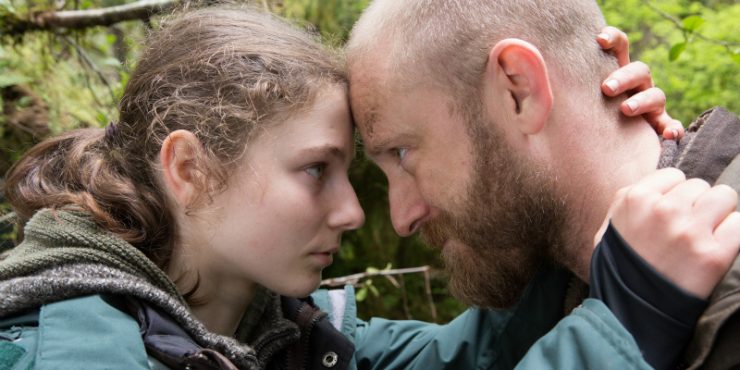The films of Debra Granik have a bruised, inky nature to them. Her characters are hurt, occasionally floundering, always paranoid about where the next strike will come from. Her first two features dealt with addiction. Down to the Bone was a about a wife and mother’s secret habit, and how she coped with it. Winter’s Bone – her biggest hit – was about a young girl struggling to survive in a town ravaged by meth addicts. Both movies empathize with addiction, without sparing the consequences these behaviors bring. Leave No Trace has no addiction narrative. A father (a great Ben Foster) and his adolescent daughter (newcomer Thomasin McKenzie) sustain a steady life in the woods just outside Portland. She sees wonder in nature, but he only sees refuge from the outside world. Together they’ve built a strong bond that meets its match when that outside world finally comes barging in.
Will is a veteran ravaged by suicidal thoughts. A widower, his only family is Tom, his intelligent, dependable daughter. He teaches her how to read and write at a level ahead of where she would have been at school, and most importantly, he teaches her how to survive in the wild, and how to avoid those that want to bring them out. We get little backstory. We don’t know how Tom’s mother died (we don’t even learn her name), nor how long they’ve been out there. It’s been long enough for Tom to know the ropes. Through various tests and drills, Will has prepared her for the inevitable sighting. Despite this, they have little recourse when a jogger reports them to the police and they’re arrested for making a home in a state park. Despondent, Tom hates being separated from her father, while Will finally realizes that all the work he’s done to make her a student of nature will be undone by the force of society.
Most of Leave No Trace deals with the tension between Will’s incessant need to escape the normal world and Tom’s curiosity in initially encountering it. He’s seen too much of the world to fully place himself within it, and she’s seen so little that she can’t help but want to reach out and grab it. The tension seldom raises above soft passive-aggressions, Tom’s helpless whimpers as her father pleads with her to join his plans of escape. The father and daughter blow past sincere state employees trying desperately to help and wilderness communities who recognize Will’s pain but know there is little they can do to squelch it. Will is a man left behind, given little more than a few prescriptions from the VA, which he sells to others living in tents. His need to escape has no malice, but he becomes physically unable to stay put. It’s only when that inability rubs up against Tom’s newfound need to plant herself within her own community does a problem arise.
Ben Foster has already had a handful of roles as both an active and inactive serviceman. The Messenger showed that he has the intensity to portray in a glance a world of self-loathing and self-destruction. Leave No Trace has a much more cerebral performance from him, bubbling with contradictions and pain. He wants to think that he feels nothing stronger than his love for Tom, but the truth is his fear of society is the biggest feeling he has. A lot of shame and pride is built into Will, and Foster is one of the few actors capable of performing this so modestly. Across from him, Thomasin McKenzie gives a startling good performance, soft-spoken but confident, intelligent but naive. Her introduction to the world brings so much confusion and resentment. For the first time, she can see how much fear drives her father, and that shattered world view leaves her with little to contemplate.
Granik’s movies dwell on people trying to cope with being discarded. They accept their fates, but the scars are still readily visible and easy to re-injure. Will knows there is no escape for him, and the hardest thing for him to learn is that Tom still has a chance. I adore the way Granik allows these characters to come to their own conclusions. There’s no rush, no need for Tom and Will to have an explosive argument. There strain is gradual and steady, but still heartbreaking, a natural separation with two people who have become distended within their own natural world. I loved this film, and the way it spoke for an entire gulf of America that has come unglued, who has been crushed so deliberately by a ruthless, capitalist structure that cares little for their needs and vulnerabilities. Leave No Trace makes no room for anger, though, just love; a love that perseveres through the natural turmoil of being alive.
Directed by Debra Granik










